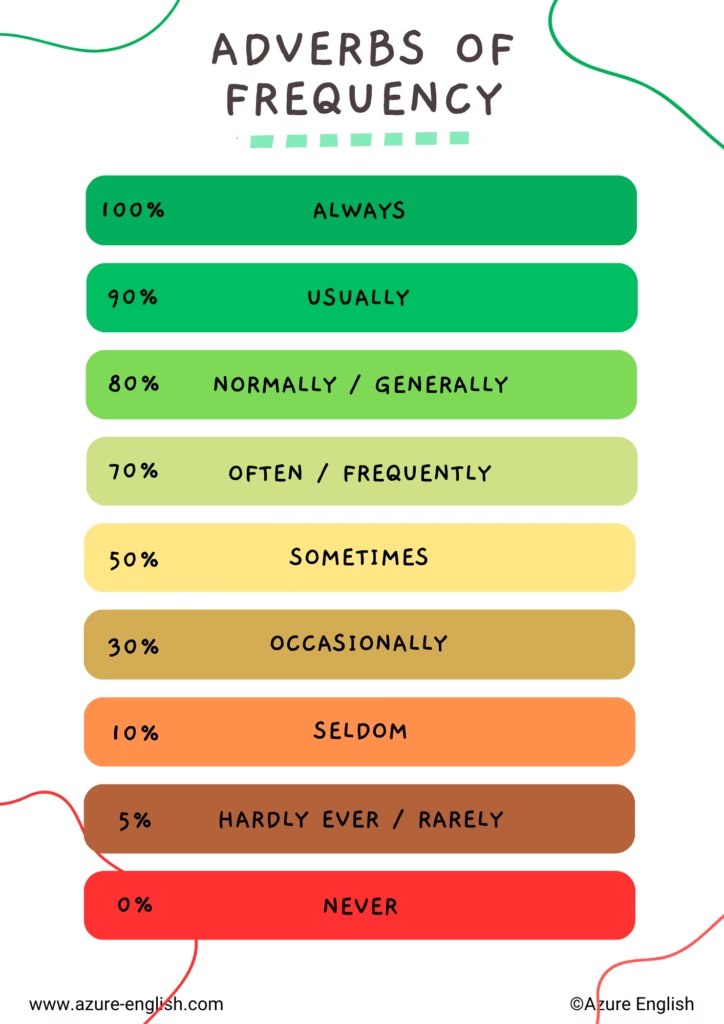Have you ever wondered how to talk about how often you do something? Do you want to say you “always drink coffee in the morning” or that you “sometimes forget your keys”? If so, you’re already using adverbs of frequency—even if you didn’t know their name.
In this post, we’ll break down everything you need to know about adverbs of frequency. We’ll keep things simple but informative, so by the end, you’ll be confident using them in your everyday English.
What Are Adverbs of Frequency?
Adverbs of frequency are words that tell us how often something happens. They help describe actions that happen regularly, sometimes, rarely, or never.
For example:
- I usually wake up at 7 a.m.
- She never eats meat.
- They often go hiking on weekends.
These adverbs give extra detail and make our communication clearer and more specific.
Common Adverbs of Frequency
Here’s a list of the most common adverbs of frequency, from most frequent to least frequent:
| Adverb | Meaning |
|---|---|
| Always | 100% of the time |
| Usually | Around 90% of the time |
| Normally/Generally | Around 80% of the time |
| Often/Frequently | Around 70% of the time |
| Sometimes | Around 50% of the time |
| Occasionally | Around 30% of the time |
| Seldom | Around 10% of the time |
| Hardly Ever/Rarely | Around 5% of the time |
| Never | 0% of the time |
Remember, these percentages are not exact—they just give a general idea of how frequently something happens.

Where Do They Go in a Sentence?
Adverbs of frequency usually go before the main verb, but after the verb “to be.” Let’s look at both situations.
1. With Regular Verbs:
Put the adverb before the main verb.
- I always take the bus to work.
- He often eats lunch at his desk.
- We sometimes go out for dinner.
2. With the Verb “To Be”:
Place the adverb after the verb.
- She is always friendly.
- They are usually late.
- I am never bored in that class.
3. With Modal Verbs (can, will, should, etc.):
Put the adverb after the modal verb.
- You should always wear a seatbelt.
- He can never remember names.
Tips to Sound More Natural
- Don’t overuse adverbs. If you use “always” or “never” too often, it might sound exaggerated. Mix them up.
- Pair them with habits. These adverbs are perfect when talking about your routines or usual behavior.
- Use them for emphasis. Saying “I never lie” is stronger than just “I don’t lie.”
Practice Time
Let’s practice using a few adverbs of frequency. Try filling in the blanks with your own answers:
- I ______ check my phone before bed.
- My friends and I ______ go to the beach in summer.
- I ______ eat vegetables with dinner.
- He ______ forgets his wallet.
(Scroll down to the end of the post for sample answers!)
Why They Matter
Understanding and using adverbs of frequency helps you speak and write with more clarity. Whether you’re having a casual chat or writing a formal email, being able to express how often something happens is a powerful skill.
Plus, these adverbs are super common in English. You’ll hear them in conversations, see them in books, and come across them in songs, ads, and movies.
Quick Recap
- Adverbs of frequency describe how often something happens.
- Examples: always, usually, often, sometimes, rarely, never.
- They usually go before the main verb, but after the verb to be.
- Using them makes your language more precise and expressive.
Sample Answers from Practice
- I always check my phone before bed.
- My friends and I often go to the beach in summer.
- I usually eat vegetables with dinner.
- He sometimes forgets his wallet.
Got the hang of it? Try listening to your daily conversations or reading something in English today. See how often you spot these adverbs—and start using them yourself!
If you want more grammar tips like this, stick around for future posts.